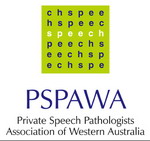 |
|||||||||||||
|
|
|||||||||||||
 |
||
|
What does a Speech Pathologist do ?
What is a Speech Pathologist ? In addition to communication skills, Speech Pathologists assess and manage clients with difficulties with reading and writing (literacy impairment) and oral motor skills (swallowing and feeding). Speech Pathologists have in the past been called Speech Therapists, and are sometimes referred to as Speech-Language Pathologists and Speech and Language Therapists. All members of PSPAWA are also practicing members of Speech Pathology Australia. Who does a Speech Pathologist see ? What does a Speech Pathologist do ? Management may take a variety of forms, depending upon the needs of the client. It may include individual sessions, group sessions, prescribing of equipment, classroom activities, or contact with other professionals (e.g. teachers, workshop managers, occupational therapists, psychologists, paediatrician, ENT surgeons). Case conferencing can be an integral part of management of a client’s needs. Consultation with family members, school teachers, work colleagues, and other significant communication partners is vital to ensure success of the management program and the client reaching their full potential. Speech Pathologists can also provide education sessions to community groups, schools, playgroups, and other interested parties. What types of difficulties does a Speech Pathologist manage ?
Speech Pathologists also work with children and adults with specific diagnoses such as:
Some members of PSPAWA have a special interest or experience in particular topics, including: |
||